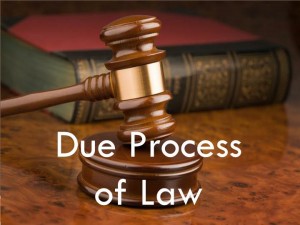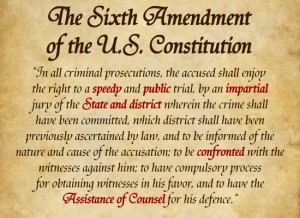Defense At A Criminal Trial: Admitting Third-Party Culpability Evidence
People v. Powell
2016 NY Slip Op 02555
New York Court of Appeals
Decided on: April 5, 2016
Issue: Whether defendant’s constitutional right to present a complete defense was violated when the trial court abused its discretion denying the admissibility of third-party culpability evidence in his defense because it would have caused undue delay, prejudice, and confusion.
Holding: No. The Court of Appeals held that the trial court did not abuse its discretion in finding the proffer speculative, and in determining the evidence to support it, would have caused undue delay, prejudice, and confusion.
The Primo standard for third-party culpability evidence, the general evidentiary balancing test, does not infringe upon a defendant’s constitutional right to present a complete defense. As the Holme’s Court noted, rules applying the standard balancing test of prejudice versus probative value to proffers of third-party culpability evidence are widely accepted, 547 US at 327. Requiring a defendant seeking to admit third-party culpability evidence to establish that the probative value or relevant evidence outweighs the appropriate countervailing factors is neither arbitrary nor disproportionate to the purpose of the rule.
The countervailing risks of delay, prejudice and confusion are particularly acute and if those concerns were not weighed against the probative value of evidence, the fact-finding process would break down under a mass speculation and conjecture, Primo, 96 NY2d at 356-357.
Facts: Jennifer Katz was murdered and defendant’s brother, Warren Powell, was a sanitation worker and his collection route included Katz’s home. Warren and Katz had a prior relationship and during that time, Katz purchased a $500,000 life insurance policy that named Warren as the beneficiary. On Warren’s recommendation, Katz hired defendant to do gardening and other work. On December 29, 2016, Warren and his coworker noticed that Katz had left her garbage cans at the curb from the day before and he found this strange because Katz was meticulous about retrieving her empty garbage cans and placing recyclables out for collection.
Before police discovered the body the following evening, they stopped defendant who was driving Katz’s car for a routine traffic violation. Defendant made voluntary statements to the police that he had discovered Katz’s body in a closet in her home and that he feared he would be blamed for her murder because he was on parole. The People presented forensic evidence that defendant’s DNA was present on several pairs of men’s underwear in the hamper of Katz’s bedroom. His DNA was also found on her genitals and on her underwear, as well as on some bedding.
Before trial, the People move to preclude defendant from introducing evidence that Warren was the beneficiary of the victims $500,000 life insurance policy and from mentioning the policy in his opening statement. In response, defense counsel argued that Warren may have a motive and be the person of interest in this case. The trial court granted the People’s motion, concluding that defendant failed to reach the threshold to admit third-party culpability evidence, stating that defendant could not have it both ways. The court noted that it was not clear that defendant is actually accusing Warren of doing the murder and that it was an essential element of third-party culpability.
 During trial defense repeatedly denied that he was attempting to prove third-party culpability, insisting that he was not making an accusation yet, but simply gathering the facts to lay out the foundation. The court reiterated to defense counsel that he must make an offer of proof demonstrating the relevance and materiality of any proffered third-party culpability. Nevertheless, defense counsel continued his attempt to show that there is evidence in the case someone else could have killed Katz.
During trial defense repeatedly denied that he was attempting to prove third-party culpability, insisting that he was not making an accusation yet, but simply gathering the facts to lay out the foundation. The court reiterated to defense counsel that he must make an offer of proof demonstrating the relevance and materiality of any proffered third-party culpability. Nevertheless, defense counsel continued his attempt to show that there is evidence in the case someone else could have killed Katz.
Warren testified at trial, but the court limited defendant’s cross-examination. On direct examination, Warren testified that Katz had asked him to move out of the house about six months before the murder, but defendant was precluded from exploring the reasons for the couples’ separation. The jury found defendant guilty of murder in the first-degree and several other crimes, and defendant was sentenced to life imprisonment without parole. On defendant’s appeal, the Appellate Division affirmed, holding that the trial court properly precluded defendant from presenting evidence of third-party culpability since the proposed evidence was based on mere speculation. A Judge of the Court of Appeals granted leave to appeal and the Court of Appeals affirmed holding that the trial court was within its discretion in finding that proffer speculative and in determining the evidence to support it would have caused undue delay, prejudice, and confusion.
Legal Analysis: The Court of Appeals held that they rejected the notion in People v Primo that evidence of third-party culpability occupies a special or exotic category of proof requiring a heightened evidentiary standard for admission (96 NY2d 351, 356 [2001]. Instead, the Court of Appeals clarified that third-party culpability evidence should be evaluated in accordance with ordinary evidentiary principles by balancing the proffered evidence?probative value against its potential for undue prejudice, delay, and confusion. Defendant challenges the Primo standard as constitutionally deficient in light of the Supreme Courts subsequent ruling in Holmes v South Carolina (547 US 319 [2006].) The Court of Appeals now confirm that the standard set forth in Primo does not infringe upon a defendant’s constitutional right to present a complete defense as set forth in the Sixth and Fourteenth Amendments. Applying that standard here, the Court concludes that the trial court did not abuse its discretion by precluding defendant’s ill-defined and speculative third-party culpability evidence.
On appeal, defendant argues that New York’s standard for admitting third-party culpability evidence fails to adequately protect a defendants constitutional right to present a complete defense. The main thrust of defendant’s argument at trial was that the proffered third-party culpability evidence was admissible under the Primo standard, not that the standard was unconstitutional. Nevertheless, defendant presented his constitutional claim to the trial court, and the court rejected it. As such, defendant’s constitutional argument preserved, CPL 470.05[2], but for the reasons that follow, is without merit.
As the Holmes Court acknowledged, states, have broad latitude under the Constitution to establish rules excluding evidence from criminal trials (Holmes, 547 US at 324. The latitude is limited, however, by the Fourteenth Amendment’s Due Process Clause and the Sixth Amendment’s Compulsory Process and Confrontation Clauses, which guarantee criminal defendant’s a meaningful opportunity to present a complete defense, People v Carroll, 95 NY2d 375, 385[2000].
 A defendant’s right to present a defense is abridged by evidence rules that infringe upon a weighty interest of the accused and are arbitrary or disproportionate to the purposes they are designed to serve, Holmes, 547 US at 324. In Holmes, the Supreme Court invalidated South Carolinas rule precluding a defendant from introducing proof of third-party guilt if the prosecution had introduced forensic evidence that, if believed, strongly supported a guilty verdict on the ground that it violated a defendant’s right to have a meaningful opportunity to present a complete defense. In applying that rule, the trial judge did not focus on the probative value or the potential adverse effects of admitting the defense evidence of third-party guilt; rather the inquiry improperly focused on strength of the prosecution’s case.
A defendant’s right to present a defense is abridged by evidence rules that infringe upon a weighty interest of the accused and are arbitrary or disproportionate to the purposes they are designed to serve, Holmes, 547 US at 324. In Holmes, the Supreme Court invalidated South Carolinas rule precluding a defendant from introducing proof of third-party guilt if the prosecution had introduced forensic evidence that, if believed, strongly supported a guilty verdict on the ground that it violated a defendant’s right to have a meaningful opportunity to present a complete defense. In applying that rule, the trial judge did not focus on the probative value or the potential adverse effects of admitting the defense evidence of third-party guilt; rather the inquiry improperly focused on strength of the prosecution’s case.
While acknowledging that exclusion of defendant’s evidence under such a test is prohibited by the Constitution, the Supreme Court affirmed that well-established rules of evidence permit trial judges to exclude evidence if its probative value is outweighed by certain other factors such as unfair prejudice, confusion of the issues, or potential to mislead the jury and that a specific application of this principle is found in the rules regulating admission of evidence proffered by criminal defendants to show that someone else committed the crime with which they are charged.
The standard articulated in Primo is fully consistent with the Holmes principles discussed above. Unlike the rule at issue in Holmes, the standard clarified by the Court of Appeals in Primo focuses exclusively on the probative value of the third-party culpability evidence as weighed against its potential countervailing adverse effects. In Primo, the Court of Appeals rejected the clear link articulation of this standard that the Appellate Division apparently gleaned from the decision in Greenfield v People, 85 NY 75 [1881] noting that the Greenfield Court said nothing to suggest that it was fashioning a new or specialized test for evidence of third-party culpability, Primo, 96 NY2d at 354-355. Accordingly, in Primo, The Court of Appeals confirmed that no heightened standard exists for admission of third-party culpability evidence; instead admissibility of such evidence should be reviewed under the general balancing analysis that governs the admissibility of all evidence. In other words, courts should exclude evidence of third-party culpability that has slight probative value and strong potential for undue prejudice, delay and confusion or where the evidence is so remote and speculative that it does not sufficiently connect the third party to the crime, Holmes, 547 US at 327. The Court of Appeals reaffirmed this evidentiary standard in People v Negron 26 NY3d 262, 268 [2015] and People v Schulz 4 NY3d 521, 528 [2005].
The Primo standard for third-party culpability evidence, the general evidentiary balancing test, does not infringe upon a defendant’s constitutional right to present a complete defense. As the Holmes Court noted, rules applying the standard balancing test of prejudice versus probative value to proffers of third-party culpability evidence are widely accepted, 547 US at 327. Requiring a defendant seeking to admit third-party culpability evidence to establish that the probative value or relevant evidence outweighs the appropriate countervailing factors is neither arbitrary nor disproportionate to the purpose of the rule. Indeed, in this context, the countervailing risks of delay, prejudice and confusion are particularly acute and if those concerns were not weighed against the probative value of evidence, the fact-finding process would break down under a mass speculation and conjecture, Primo, 96 NY2d at 356-357.
The Court of Appeals held that they review a trial court’s determination concerning admissibility of third-party culpability evidence under an abuse of discretion standard, Schulz, 4 NY3d at 529. Here the trial court did not abuse its discretion by precluding defendant’s ambivalent offer of proof of third-party culpability. Defendant repeatedly declined to accuse Warren of committing the murder, proffering instead that the proof would show someone else could have killed the defendant or that the defendant is not the only one who could have been there.
Given defendant’s theory for admission that others could have had access to defendant’s home or might have had reason to kill her, the trial court did not abuse its discretion by precluding the proffered evidence, People v Gamble, 18 NY3d 386, 398-399[2012]. To be clear, admission of third-party culpability evidence does not necessarily require a specific accusation that an identified individual committed the crime. For example, a proffer of an unknown DNA profile may be sufficient.
The Court of Appeals held that they rejected the trial court’s assertion that such a specific accusation is an essential element of third-party culpability. Such a requirement would conflict with the balancing analysis that the Court in Primo and reaffirmed today. The trial court was within its discretion in finding that proffer speculative and in determining the evidence to support it would have caused undue delay, prejudice, and confusion. Accordingly, the Appellate Division order should be affirmed.

